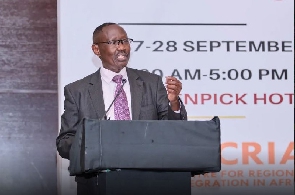 Silver Ojakol is Chief of Staff of AfCFTA
Silver Ojakol is Chief of Staff of AfCFTA
Public servants – civil servants and government appointees – instead of playing a facilitation role for small- and medium-scale enterprises (SMEs) are competing with them and hijacking their opportunities, says the Centre for Regional Integration in Africa (CRIA).
It said it has identified public servants with the mandate of implementing government policies and providing timely and satisfactory services to all stakeholders, especially SMEs, to harness benefits of the African Continental Free Trade Area (AfCFTA) as one of the barriers to competitiveness of small businesses in Ghana and many other economies on the continent.
Chairman of CRIA, Nana Owusu-Afari, explained that public servants as well as government appointees in some countries, including Ghana, either have their own businesses or are fronting as agents to some private companies; hence diverting opportunities and support meant for SMEs to the wrong places.
“In most countries, some public servants and government appointees are competitors to the private sector. They have their own companies or are agents of private companies. This becomes a barrier to the full development of SMEs. These public and civil servants should be trained to help develop the private sectors in Africa,” he said.
He mentioned that SMEs in Africa face a myriad of development and growth challenges, which are further compounded by some governments’ lack of understanding for dynamics in the largely informal SME space. However, with SMEs forming the core of businesses in the country and most economies on the continent, he said their growth and competitiveness is central to success for the continental free trade agenda.
Mr. Owusu-Afari therefore urged that all key state stakeholders see to the removal of artificial barriers as a sine qua non to the free flow of goods and services for intra-African trade.
He made these remarks at the Regional Integration Issues Forum (RIIF) 2023, held in Accra-Ghana. At the two-day conference, regional executives brainstormed on pragmatic measures to eliminate the barriers to SMEs’ effective and efficient participation in intra-African trade.
Corroborating Mr. Owusu-Afari, Chief of Staff at the AfCFTA secretariat in Accra, Silver Ojakol, underscored the need to support SMEs with alacrity – explaining that big corporations such as TotalEnergies, Shell and Coca-Cola, among other multinationals, have power, influence and connections at borders to avoid trade barriers; but the SMEs are in trouble because they have no one to call on, hence the need to pay more attention to eliminating the barriers.
“When we were signing the AfCFTA in 2019, we said the agreement being created is not for big corporations but rather SMEs. It is therefore imperative that we focus on measures that empower them to take centre-stage,” he emphasised.
For his part, the Interim Director of Programmes at Africa Capacity Building Foundation, Ian Mashingaidze, highlighted that challenges such as trade barriers, inadequate infrastructure and limited access to finance are still impeding the seamless flow of goods, services and investments across borders.
He called for attention to be shifted to enhancing the skills and knowledge of entrepreneurs, SMEs and other business actors through targetted training programmes, mentorship initiatives, and entrepreneurship development activities that equip businesses with the necessary skills to effectively participate in regional and international trade.
Recommendations
Experts at the forum advocated that the various governments introduce more measures and policies that provide opportunities to mobilise resources, build the capacity of SMEs, scale-up businesses and develop inclusivity for intra-African trade.
Equally important is the need to provide comprehensive support for small businesses: to create jobs, expand national economies and develop a sustainable continental market and ecosystem that effectively meets needs of the continent’s people.
Forum
The conference, among other things, aims to raise awareness of the AfCFTA strategy for private sector engagement; deepen the capacity of SMEs to understand how to leverage opportunities offered by the AfCFTA; and prepare SME leaders to expand their businesses through regional value chains.
The RIIF, held under the theme ‘Breaking Business Barriers for AfCFTA Acceleration’, was attended by about 150 delegates from different countries.